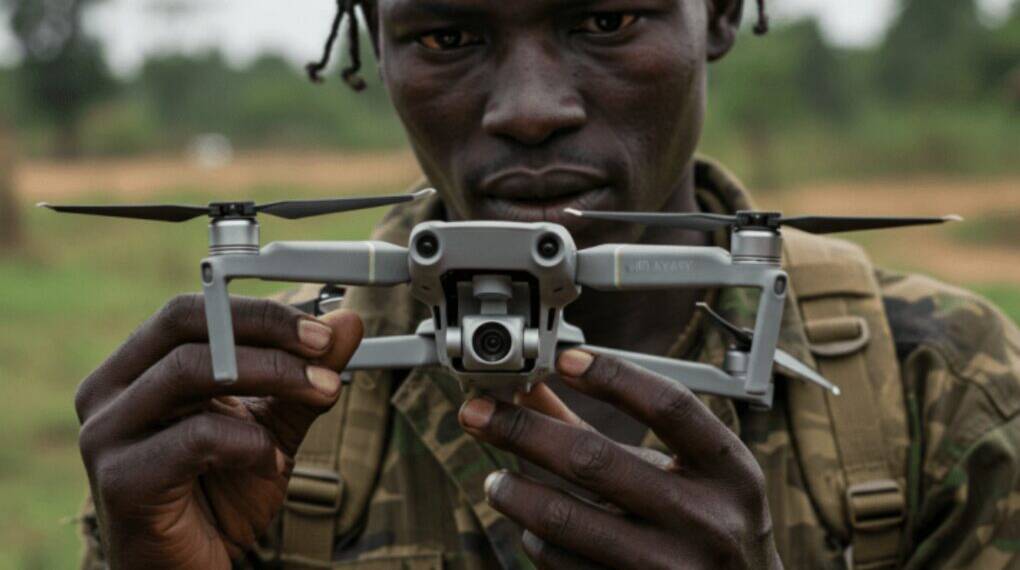Africa’s conflict landscape is evolving rapidly under the influence of three major elements: the resurgence of mercenaries and private military companies (PMCs), the widespread usage of armed drones, and the escalating deployment of artificial intelligence (AI) to disseminate disinformation. These interconnected forces are collectively reshaping warfare across the continent, challenging traditional security frameworks and complicating efforts toward lasting peace.
The Growing Influence of Mercenaries and PMCs
Mercenaries and PMCs have re-emerged as significant actors in African conflicts, capitalizing on states weakened by governance deficits and rich natural resources. The history of mercenary involvement in Africa traces back to late 20th-century conflicts, such as those in Angola during the 1970s and Sierra Leone in the 1990s, where they exploited chaos for profit. Today, contemporary groups, notably the Russian-affiliated Wagner Group—now operating under the name “Africa Corps”—maintain an active presence in numerous nations including Libya and Sudan.
These forces provide vital military backing to local power holders and political factions, furthering Moscow’s strategic goals. Meanwhile, Turkish PMCs integrate experienced combat personnel with operational armed drones to advance Ankara’s interests from North Africa to the Horn of Africa. Similarly, Chinese private security firms work to secure Beijing’s growing investments across volatile regions like the Democratic Republic of Congo and Sudan, addressing security gaps left by fragile state apparatuses.
Mercenaries live within a paradoxical framework: despite widespread condemnation, they remain crucial to sustaining prolonged conflicts. Their existence is tightly coupled to instability; peace initiatives threaten their operational relevance and income streams. Libya presents a prime example, where post-2011 factions heavily relied on foreign mercenaries, obstructing reconciliation and fueling ongoing strife.
Armed Drones: A Battlefield Revolution
Technological advancements have significantly altered conflict dynamics in Africa. Armed drones, once limited to leading global militaries, have become affordable and lethal instruments accessible to various militias and paramilitary groups. Low-cost suicide drones, capable of destroying high-value targets such as battle tanks, have disrupted conventional combat strategies. The Sudanese civil war vividly demonstrates this shift, with paramilitary forces deploying drones effectively to execute targeted strikes.
A notable incident occurred on July 31, 2024, when General Abdel Fattah al-Burhan, leader of the Sudanese Armed Forces (SAF), survived a drone-launched assassination attempt at a military base in eastern Sudan. Video footage captured the sudden shift from a ceremonial graduation to a violent attack, underscoring drones’ disruptive potential. Since then, hundreds of drone attacks have taken place across at least 15 African countries, from the skies above Khartoum to marketplaces in Mali. Such strikes have become defining features of many conflicts, influenced by rapid technological progress, falling prices, and the promise of precision air power.

Africa has witnessed early adoption of drone warfare, notably in the Libyan civil war, where drones played decisive roles in shifting territorial control. Recent attacks in Port Sudan reinforce the growing influence of unmanned aerial systems across the continent. Governments are racing to incorporate these systems alongside countermeasures to adapt to the new battlefield reality.
The proliferation spans from small, handheld reconnaissance drones to High-Altitude Long-Endurance (HALE) models capable of carrying heavy precision-guided munitions. Popular platforms include Israel’s WanderB VTOL tactical drones, U.S.-made BAE Systems Sky Eye, and Turkey’s Bayraktar TB2—the latter being Africa’s most widely used combat drone. The TB2 was instrumental in the Government of National Accord’s victory during the 2020 Battle of Tripoli, combining with upgraded air defenses and electronic jamming to outmaneuver rival forces.
Turkey has emerged as Africa’s leading drone supplier, with 32 procurement agreements across the continent, many recent, addressing a strong continental demand for affordable, modern military technology beyond traditional major powers’ export networks. Israel, the UAE, and Iran have also expanded their drone exports to African nations. Countries leading drone acquisitions include Nigeria, Algeria, Ethiopia, and Morocco.
Significantly, African nations themselves are developing indigenous drone capabilities. Enterprises across nine countries now contribute around 12 percent of Africa’s drone market, with South Africa notably producing military drones since the 1970s. Tunisia’s ENOVA Robotics even exports security robots internationally.
One alarming trend is the increasing deployment of drones by armed nonstate actors in nine African countries, including Burkina Faso, Somalia, and Sudan. These groups employ drones for reconnaissance and offensive strikes, which heralds a new era where technology is accessible even to irregular forces.
AI-Powered Disinformation: The Information Warfront
Beyond kinetic battles, conflicts in Africa increasingly unfold in the information realm. The youth-dominated continent uses social media extensively, exposing it to propaganda and AI-amplified misinformation.
Deepfakes and targeted campaigns have deepened societal rifts, challenged electoral integrity, and heightened political instability. Platforms like TikTok have been criticized for boosting divisive content, illustrating the formidable challenge of managing information warfare alongside physical conflicts.
Regulatory and Governance Challenges
The spread of mercenary groups, PMCs, and cyber-actors operating across borders with minimal oversight complicates regulation. Addressing these threats requires enhanced international intelligence collaboration and comprehensive norms to manage hybrid warfare’s physical and informational dimensions effectively.
Protecting Africa’s stability requires multifaceted strategies encompassing physical security, information integrity, and governance. Monitoring mercenary activities, curbing drone proliferation, and countering digital disinformation demand international cooperation. Failure to do so risks exacerbating instability across a geopolitically vital continent.
Also Read: Gold and Guns: Why West Africa is Bleeding?
Navigating Complexity Towards Stability
Africa’s modern conflicts are defined by the intersection of foreign mercenary influence, advanced drone warfare, and AI-fueled disinformation. Innovative, coordinated policy responses and strong global partnerships are essential to prevent further erosion of state authority. Without sustained oversight and regulation, mercenaries, warlords, and cyber manipulators will increasingly control both security and narratives—endangering long-term peace prospects in resource-rich but fragile African states.








